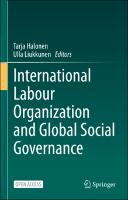Dear Colleagues,
As the only international, multilaterial agency tasked with specific task of working towards decent work for all those engaged in any form of economic activity, the International Labour Organisation (ILO) is an organisation I pay close attention to.
I have been extremely fortunate to have been able to spend time researching around the work of the ILO (and allied organisations) and teaching around - including having opportunities to take groups of UK trade unionists on study visits to the ILO head offices in Geneva. I have also been fortune to spend time teaching at the ILO's International Training Centre in Turin, Italy.And, I have had the great honour of working closely with those ILO staff who comprise the staff union, which is a member of the umbrella body for all UN staff unions, the Co-ordinating Committee of International Staff Unions and Associations (CCISUA): https://www.staffunion.org/ccisua
Because of this - and an even broader interest in forms of global social governance - I was very pleased to see that a new book on this issue has been published, and available freely via open access.

No comments:
Post a Comment